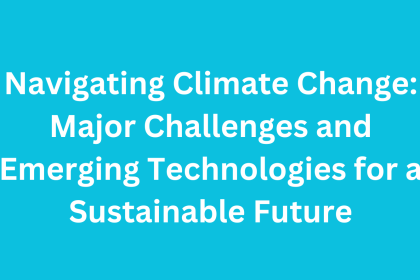
Climate change presents a myriad of interconnected challenges that threaten the health of our planet and the well-being of current and future generations. Some of the major climate change issues include:
1- Global Warming: Rising global temperatures because of the accumulation of greenhouse gases (GHGs) such as carbon dioxide (CO2), methane (CH4), and nitrous oxide (N2O) in the atmosphere. This leads to changes in weather patterns, melting polar ice caps, rising sea levels, and extreme weather events.
2- Ocean Acidification: Increased CO2 levels in the atmosphere also result in higher levels of CO2 dissolving into the oceans, leading to ocean acidification. This harms marine life, particularly organisms with calcium carbonate shells or skeletons, such as coral reefs, shellfish, and plankton.
3- Loss of Biodiversity: Climate change exacerbates habitat loss, deforestation, pollution, and other human activities that threaten biodiversity. This loss of species diversity undermines ecosystem stability and resilience, with far-reaching consequences for food security, water quality, and human health.
4- Extreme Weather Events: Climate change intensifies extreme weather events, including hurricanes, droughts, floods, heatwaves, and wildfires. These events have devastating impacts on communities, infrastructure, agriculture, and economies, leading to loss of life, displacement, and economic disruption.
5- Water Scarcity: Changes in precipitation patterns and increased evaporation rates exacerbate water scarcity in many regions, leading to competition for dwindling water resources. This affects agriculture, industry, energy production, and human health, exacerbating social inequalities and geopolitical tensions.
6- Food Insecurity: Climate change disrupts agricultural systems by altering growing conditions, increasing the frequency of pests and diseases, and reducing water availability. This leads to decreased crop yields, food shortages, price volatility, and food insecurity, particularly in vulnerable communities.
To address these complex challenges, various emerging technologies are being developed and deployed:
– Renewable Energy: Technologies such as solar, wind, hydroelectric, and geothermal power offer clean alternatives to fossil fuels, reducing GHG emissions and mitigating climate change. Advances in energy storage, grid integration, and efficiency further enhance the viability and scalability of renewable energy solutions.
– Carbon Capture and Storage (CCS): CCS technologies capture CO2 emissions from industrial processes and power plants, preventing them from entering the atmosphere. Captured CO2 can then be stored underground or utilised for enhanced oil recovery and other industrial applications.
– Electric Vehicles (EVs): The transition to electric vehicles powered by renewable energy reduces emissions from transportation, a major contributor to climate change. Advances in battery technology, charging infrastructure, and vehicle-to-grid integration support the widespread adoption of EVs.
– Climate-Smart Agriculture: Innovative agricultural practices and technologies, such as precision farming, agroforestry, and drought-resistant crops, help farmers adapt to changing climate conditions while reducing emissions from agriculture.
– Blockchain and IoT: Blockchain technology, combined with the Internet of Things (IoT), enables transparent and decentralised systems for tracking and verifying carbon credits, renewable energy certificates, and sustainable supply chains. This enhances accountability, incentivises climate-friendly practices, and promotes sustainable development.
– Climate Modelling and AI: Advanced climate modelling techniques and artificial intelligence (AI) algorithms improve our understanding of climate dynamics, predict future climate scenarios, and inform climate adaptation and mitigation strategies.
– Green Building and Infrastructure: Sustainable building materials, energy-efficient designs, and smart infrastructure technologies reduce emissions from the construction and operation of buildings, cities, and transportation networks.
While emerging technologies offer promising solutions to address climate change, effective action requires collaboration across sectors, investment in research and development, supportive policies and regulations, and collective commitment from governments, businesses, communities, and individuals. By harnessing the power of innovation and technology, we can mitigate the impacts of climate change, build resilience, and create a sustainable future for all.



